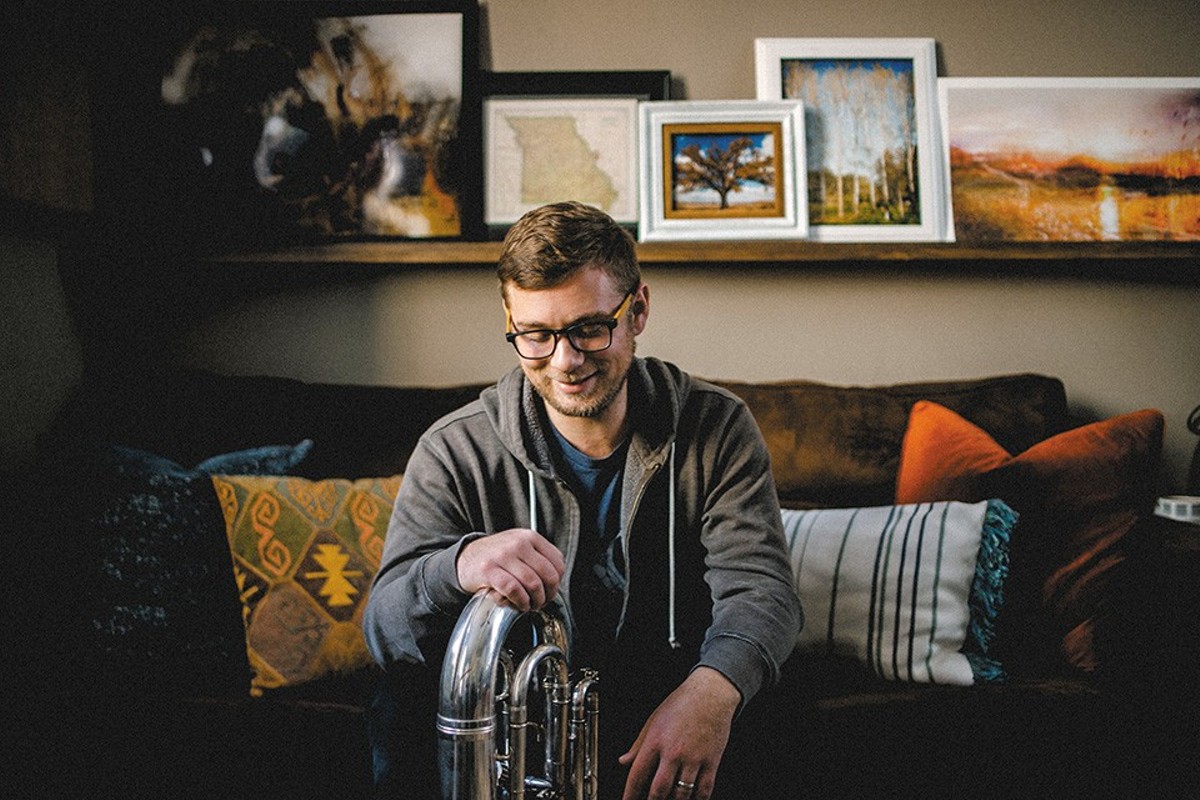In the long list of instruments and implements of rock & roll — from flying V guitars to double-kick drums to bandana-draped microphone stands — the euphonium ranks somewhere below the wood block and just above the triangle. Not as imposing as the sousaphone or as dexterous as the trombone, the valved brass instrument is most often lost in the scrum of spitvalves somewhere amongst its low-brass brethren.
But it wasn't too many years ago that Devin LaRue was drafted to dust off his euphonium and join Charlie Brumley's many-membered congregation in the Educated Guess; LaRue remembers playing a few Off Broadway shows with Brumley's group, though it was a challenge to fit over a dozen performers on the venue stage.
On his debut record, Finding Peace, LaRue breaks out his euphonium once more, but it's only one of many instruments he handles on the largely ruminative, mostly instrumental album. He also plays piano, guitar and banjo, and handles all of the arrangements of string and brass players. LaRue also sings a handful of songs in a soft, spare voice that often sounds on the verge of drifting away on the breeze.
LaRue's music is hard to categorize; fans of Sufjan Stevens will recognize some of the confessional, banjo-limned songs, while other tracks vibrate with orchestral flourishes reminiscent of San Fermin. Mostly, though, the album finds itself in a liminal space outlined by grand piano, acoustic guitar and a string quartet.
The arc of Finding Peace isn't exactly a straight line or even a concept album, but the song-suite certainly rewards a few close listens as it centers on one character's spiritual journey. On the songs LaRue sings, he posits his main character as a man lost — drawn to the solitude of nature, confused by his relationship to God and others, a stranger to his own heart. Opening with dark-tinted piano chords and ending with synth-drums and a saxophone solo, Finding Peace feels a little like watching Dorothy Gale move from black-and-white Kansas to technicolor Oz. And like Dorothy, a journey is part of LaRue's intention.
"I was trying to arrange them in sort of an arc where you start here and end there," he explains.
LaRue says that in writing these lyrics and arrangements, he found himself "considering both the beauty of nature and how beautifully complex everything is, but also acknowledging the danger of nature; a person can't exist on their own without a community." LaRue doesn't claim these songs as his autobiography. "As tempting as it is to be a recluse, I need people in my life as well," he says.
LaRue also notes that his own Christian faith plays an undeniable factor as well; song titles like "Creation," "Hardly Eden" and "After the Fall" don't try to hide some of the more overt themes.
"It wasn't important to be overt; it was more an epic vernacular," LaRue says. "It is painting a very Christian message — I can't skirt away from the fact that it was written with an overt spirituality in mind. But I didn't want to offend someone of a different faith or feel like they had to understand Christian theology in order to get it."
Much of that purposeful opacity comes through the album's largely instrumental composition, though LaRue's lyrics remain impressionistic enough for the listener to hang individual experiences upon.
"A lot of the artists I like to listen to are really cryptic with their words, like Bon Iver," he says. "I'm just not that good of a wordsmith. I didn't want to use too many words because I fear I'd run out of them."
And because Finding Peace was composed with strings and horns in mind, the instrumental passages, be they propulsive or seemingly aimless, tell a big part of the story as well. "I also didn't want my voice to be the showcase; I just wanted to give enough words and lyrics to put it on a track to get the listener started," LaRue says. "The instrumentals allow the listener to add their own story to it. I wanted it to be a loose enough story that anyone could apply their life to it."
This is LaRue's debut recording, and it's an ambitious entrance for someone whose day job as an audio engineer keeps him behind the scenes. And while there is no current plan to take this project onto local stages, LaRue felt that this sizable chunk of music (collected as a double-LP in the handsome vinyl edition) needed to exist as a solitary piece rather than dribbled out in tentative spurts of music here and there.
LaRue says that about eight years ago he had released a few songs online in a low-profile sort of way; he had no plans or desires to tour or promote the songs. But he found that the breadth of his vision didn't match the quick-hit style of streaming that many listeners were engaging in.
"It was difficult to sell people on my style just showing them one song. I couldn't put my style into one genre, so I wanted all the styles I enjoy to speak to one style that was me," he says. "If people listen as a whole, they would be able to understand my style better than with a single."






